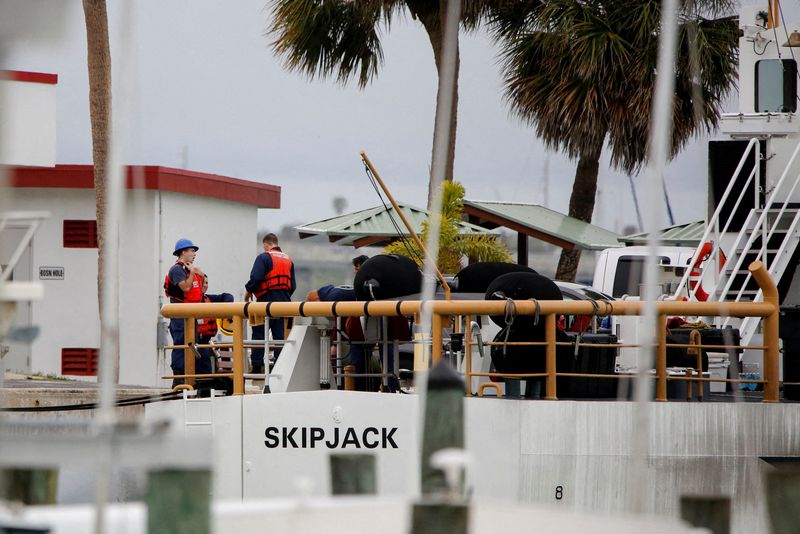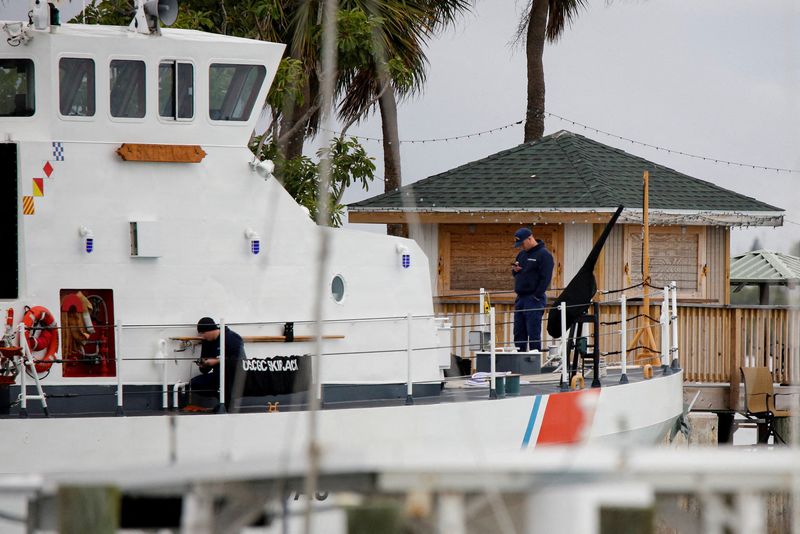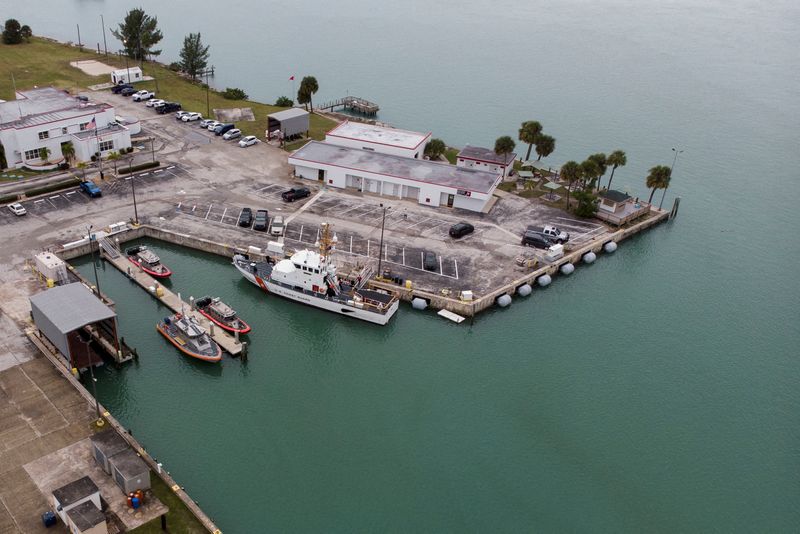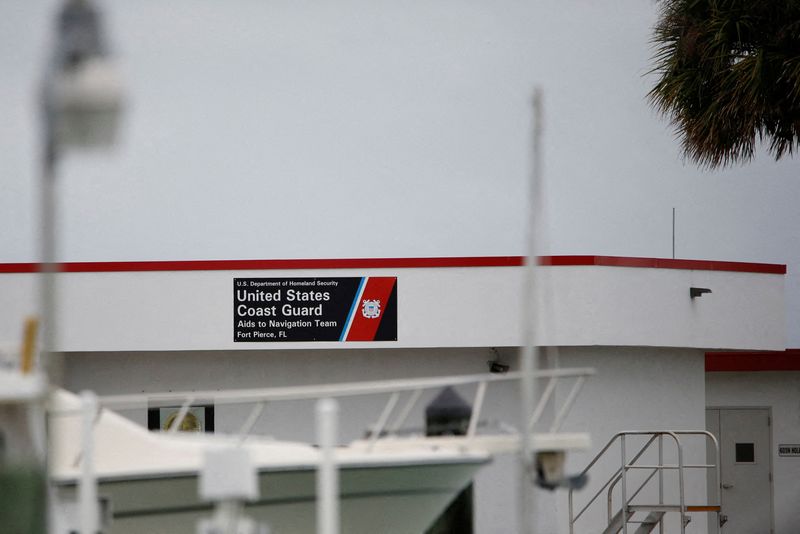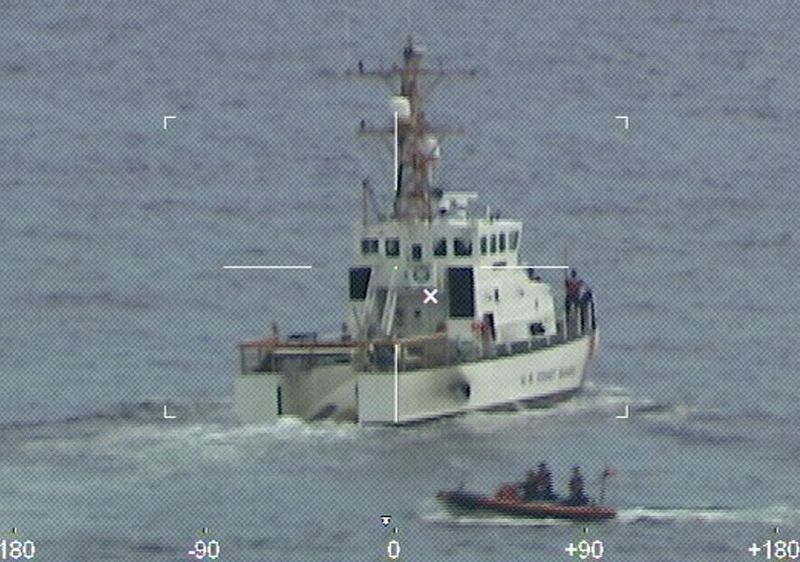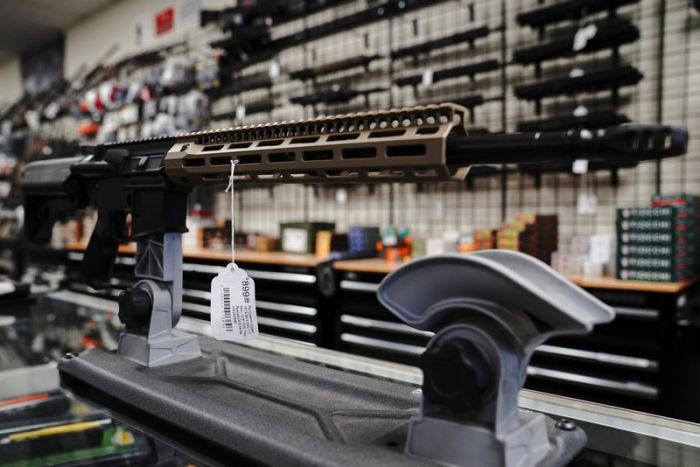MIAMI (Reuters) -Rescue crews recovered one body but hopes dimmed for 38 other people lost at sea over the weekend from a capsized boat off Florida’s coast in an incident being treated as an ill-fated human smuggling attempt, the U.S. Coast Guard said on Wednesday.
The search-and-recovery operation stretched through a second full day on Wednesday as the Coast Guard reported intercepting a separate sailing vessel off the Bahamas overloaded with 191 Haitian migrants believed to be headed for Florida.
The two incidents underscored a surge in migrants seeking passage to Florida in flimsy vessels through the Caribbean by way of the Bahamas, a known hub for sea-borne human smuggling.
The Coast Guard said in a Twitter post that its teams would “continue to search throughout the night for the missing people” whose boat was reported by a lone survivor to have overturned in rough seas on Sunday morning.
A Coast Guard spokesman, Petty Officer Jose Hernandez, acknowledged late Wednesday that chances of finding anyone else alive were dwindling but that officials would “reassess” the situation on Thursday morning.
The survivor, found clinging to the overturned vessel on Tuesday, told authorities after his rescue that he was one of 40 people aboard the boat when it left the Bahamas’ Bimini islands, about 50 miles (80 km) east of Miami, on Saturday night, the Coast Guard said.
The vessel capsized the next morning about 45 miles (72 km) east of Fort Pierce Inlet, off Florida’s Atlantic coast, about midway between Miami and Cape Canaveral. According to the survivor, nobody aboard had been wearing a life jacket.
Their nationalities have not been released. But vessel crossings of Haitian migrants have grown more frequent as the Caribbean island nation faces worsening economic and political crises, as well as gang-related kidnappings.
“We do suspect that this is a case of human smuggling, as this event occurred in a normal route for human smuggling,” Coast Guard Commander Jo-Ann Burdian told a Miami news conference.
DISTRAUGHT SURVIVOR
The survivor was first spotted at around 8 a.m. on Tuesday by crew members of a private tugboat who saw “there was somebody who was pretty distraught on the vessel,” said Joshua Nelson, operations manager for the Jacksonville Fleet of Signet Maritime Corp, which owns the tug.
“We were towing a very large barge that was roughly 2,500 feet behind us, so it (took) a little finesse to get close enough to the vessel and not cause any waves to knock the man off,” Nelson said in a telephone interview.
The crew immediately alerted the Coast Guard, Nelson said.
The accident coincided with a small-craft advisory posted for the area warning of high winds and heavy seas, according to the Coast Guard.
Thirty-two other people were rescued from a capsized vessel west of Bimini last Friday in yet another migrant crossing attempt gone awry.
“The waters in the northern Florida Straits can be quite treacherous,” Burdian said. “In cases like this, small vessels, overloaded, inexperienced operators, at night in bad weather can be incredibly dangerous.”
Through Wednesday morning, Coast Guard cutter crews, helicopter teams, search planes and a U.S. Navy air crew crisscrossed an area spanning more than 1,300 square miles (3,367 square km), about the size of Rhode Island, between Bimini and Fort Pierce Inlet, a Coast Guard statement said.
Incidents of overturned or interdicted vessels crowded with people, many of them Haitians or Cubans seeking to reach the United States, are not uncommon in the waters off Florida.
“There’s (been) an increase in these human smuggling organizations” over the last year, Anthony Salisbury, special agent in charge of the Homeland Security Investigations office in Miami, said in a telephone interview.
“These human smuggling organizations, you’re dealing with criminals,” Salisbury said. “They really prey on the migrant community.”
Last May, 12 Cuban migrants died and eight were rescued after their boat flipped over off Key West, Florida.
At least 557 Cuban migrants and more than 800 Haitians have been picked up at sea by the Coast Guard since October, in addition to nearly 7,400 Cubans and 3,900 Haitians interdicted during the previous five years, according to the agency.
(Reporting by Brian Ellsworth in Miami; Additional reporting by Brendan O’Brien in Chicago and Steve Gorman in Los Angeles; Writing by Steve Gorman; Editing by Jonathan Oatis)

